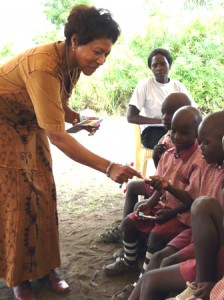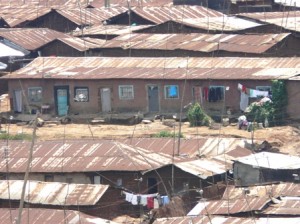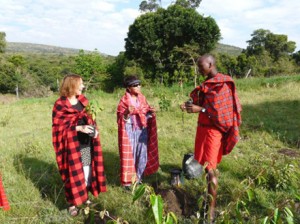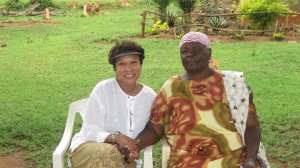Dr. Patricia Hinchberger, director of the master’s entry-level professional nursing program (MEPN) at California State University, Dominguez Hills, participated in a humanitarian mission to Africa last fall led by the Worldwide Network for Gender Empowerment (WNGE) at Fielding Graduate University in Santa Barbara. The organization, which Hinchberger has been a core member of since 2007, visited villages in Kenya, including Kibera, the second largest urban slum in Africa.

An expert on health promotion, disease prevention, and community health, Hinchberger helped educate children in the village of Kunya about dental hygiene. WNGE, along with financial support from the “Full Circle Living” organization delivered toothbrushes and toothpaste, and discussed the importance of daily brushing at a community health event organized by founder and WNGE member, Joyce Oneko, at a day care operated by the Mama na Dada Africa. Hinchberger notes that the group of visiting health professionals and educators had to be culturally sensitive to more primitive oral hygiene practices.
“They take a twig and pound it down until it almost has ‘bristles,’ that’s what they use to brush their teeth,” she said. “We asked them which was the best, and they said, ‘Well, we’re not quite sure about that because with a toothbrush, you were saying we might have to get rid of them in six months or so. We might not have more toothbrushes. But we can always go out and get a twig.’”
Hinchberger and her colleagues got their own taste of rural life in Africa while staying in brick huts for six days in the village of Kunya in Kisumu. She was joined by Dr. Andrea Zielke-Nadkarni, a nurse researcher from the University of Münster and Dr. Ani Kalayjian, an adjunct professor of psychology from Fordham University.
“I actually enjoyed it,” recalled Hinchberger. “Living in huts and going back to the kinds of things I did as a child growing up in the Hill District, which is in the slums of Pittsburgh. I reverted back to washing myself in a pan of water, using it to flush the toilet.”

Upon visiting Kibera, Hinchberger was struck by the abject poverty and unsanitary living conditions.
“[In Kisumu], we actually had a toilet in our hut, a major step up from the Kibera area, which typically has one outdoor communal bathroom for at least 30 individuals, ” she said. “When I looked at the slums there and compared them to where I grew up, it was like I had lived in Beverly Hills in comparison.
“But what amazes me most is how resilient the people are there. They came into the cities to find work, and that was how those slums developed. So they remain there and the conditions are just not very favorable. No indoor plumbing, no running water. Women who are going to the wells to get water would get raped on the way. There were a number of issues related to being in that type of environment and not having any control of [one’s] life.”

Hinchberger and her colleagues worked with women’s health issues in Kenyan communities, including discussions on women’s health, HIV/AIDS prevention, and ending the traditional – and dangerous – practice of female circumcision. She said that she took every available opportunity to explain to Kenyans the health hazards and other social issues surrounding the ancient custom.
“It has nothing to do with religion and cleanliness,” Hinchberger said. “Unfortunately, some of the women are supported financially by it… they are paid to do this to other women in ceremony. Many men will not marry [a woman who is] not circumcised. Right after [the girls] have their first menstrual period, they schedule a circumcision. Now with the availability of safe houses, the girls can run away if they choose. Before, there was no where to run and no village would take them back.”
A small number of local nonprofits and NGOs – and the personal efforts of Sarah Obama, paternal step-grandmother to President Barack Obama – are working to educate Africans about the hazards of female circumcision. Hinchberger noted that change is going to take time.
“You find little groups of individuals who are willing to take these women in or profess that this is not a positive approach to living,” she said. “When I was in Eritrea in 2006, the religious groups got together and developed a video [with] a speaker from each of the religions saying that this is not a good practice and has nothing to do with religion. I did not see anything [in Kenya] that was as organized.”

During her visit, Hinchberger also met Obama, a resident of Kogelo, who had recently received an honorary doctorate from the Great Lakes University of Kisumu for her dedication to assisting young women who are seeking a way out of poverty and cultural subjugation to men.
“Sarah Obama supports 10 to 20 young girls by herself, feeds them, clothes them, sends them to school, the whole nine yards,” said Hinchberger. “She, of course, has the ability to leave the village and move at any time, but she has chosen not to do that because she wants to make sure these girls get a proper education and have the ability to leave the villages if they choose to do so.”
Hinchberger said that the global impact of the 44th President of the United States is still felt in his father’s homeland, where visitors are eager to see the origins of the paternal side of his family.
“She was receiving people to talk with her about her doctorate and about how she felt about so many people coming to see her now,” said Hinchberger. “They are quite aware of what [President] Obama brings to this environment as well as what he has done in the states.”
Hinchberger said that at the time of the WNGE visit, the country had just held the election of its new constitution, which she hopes will mean great change for the women of Kenya, who have until now, lived under the laws and mores of a male-dominated culture.
“[The culture] is definitely driven by men,” she said. “Within the constitution, they had written that the legislature must be a certain percentage of women, so this was a major step forward.”
For more information on the School of Nursing at CSU Dominguez Hills, click here.